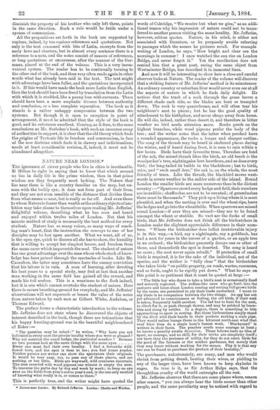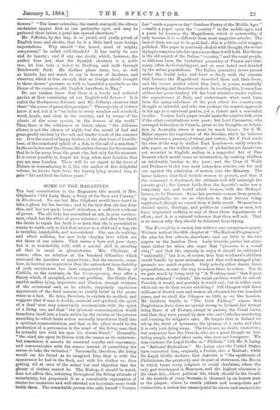NATURE NEAR LONDON.* THE ignorance of clever people who live
in cities is inestimable. If Milton be right in saying that to know that which around
us lies in daily life is the prime wisdom, then in that prime
wisdom are they frequently most lacking. The Nature that dies near them is like a country familiar on the map, but un- seen with the bodily eye ; it does not form part of their lives, and they are not even sensible of the distance that divides them from what seems so near, but is really so far off. And even those to whom Nature is dearer than wealth or the ordinary objects of am- bition may take shame to themselves upon reading Mr. Jefferies' delightful volume, describing what he has seen and heard and enjoyed within twelve miles of London. Not that his minute method of study is necessarily the best method for every
student. Nature has so many voices, so many ways of reach- ing man's heart, that the instruction she conveys to one of her disciples may be lost upon another. What we want, all of us, is the open eye, quick to discern all she has to show, the humility that is willing to accept her simplest lesson, and freedom from the mean cares which impoverish the soul. The student of nature
has one great advantage over the man whose whole stock of know- ledge has been gained through the spectacles of books. Like Mr. Casaubon, the latter may sometimes have the uneasy conviction that his labour is in vain. A man of learning, after devoting his best years to a special study, may find at last that another man working in the same field has gained all the reward, and made his toil useless. This is a weariness to the flesh indeed, but it is one which cannot overtake the student of nature. Here there is secure breathing-ground for everybody, and Mr. Jefferies' observations will not supersede or lessen the value of the notes from nature taken by such men as Gilbert White, Audubon, or Thomas Edward.
The preface forms a characteristic introduction to the volume. Mr. Jefferies does not state where he discovered the objects of interest described in the book, though there are intimations that his happy hunting-ground was in the beautiful neighbourhood of Esher
The question may be asked : " he writes, " Why have you not indicated in every case the precise locality where you were so pleased ? Why not mention the exact hedge, the particular meadow P Because no two persons look at the same things with the same eyes. . . . . . Every one must find their own locality. I find a favourite wild- flower here, and the spot is dear to me ; you find yours yonder. Neither painter nor writer can show the spectators their originals. It would be very easy, too, to pass any of these places, and see nothing, or but little. Birds are wayward, wild creatures uncertain. The tree crowded with wood pigeons one minute is empty the next. To traverse the paths day by day and week by week; to keep an eye ever on the fields from year's end to year's end, is the one only method of knowing what really is in, or comes to them."
This is perfectly true, and the writer might have quoted the • Nature war London. By Richard Jefferies. London: Ohatto and Winans.
words of Coleridge, " We receive but what we give," as an addi- tional reason why his impression of nature could not be trans- ferred to another person visiting the same locality. Mr. Jefferies, however, seldom quotes. Nature, in his mind, is either not associated with literature, or he purposely avoids referring to passages which the scenes he pictures recall. For example writing of London, he says, " How bright and clear are the mornings in summer ! I once watched the sun rise on London Bridge, and never forgot it." Yet the recollection does not remind him that a great poet, seeing the same object from Westminster Bridge, has described it in immortal lines.
And now it will be interesting to show how a close and careful observer looks at Nature. The reader of the volume will discover that a striking feature of Mr. Jefferies' method is its minuteness An ordinary country or suburban liver would never even see at all the aspects of nature in which he finds daily delight. He notices that the track of a rook through the grass leaves a different shade each side, as the blades are bent or trampled down. The rook is very quarrelsome, and will often tear his neighbour's nest to pieces ; but he has the good quality of attachment to his birthplace, and never sleeps away from home. He will die, indeed, rather than desert it, and therefore in bitter weather no bird needs attention more. Rooks perch on the highest branches, while wood pigeons prefer the body of the tree ; and the writer notes that the latter when perched have a rounded appearance, the rooks a longer and sharper outline. The song of the thrush may be heard in sheltered places during the winter, and if heard during frost, it is sure to rain within a few hours. Birds have their favourite trees. Thrushes are fond of the ash, the missel-thrash likes the birch, an old beech is the woodpecker's tree, nightingales love hawthorn, and so does every bird ; the long-tailed tit builds in the blackthorn ; but to birds, mice, and " such small deer," the oak is, on the whole, the most friendly of trees. Like the thrush, the blackbird moves west- wards in severe weather to the milder side of the island. Round London the smaller birds are more numerous than in the distant country :—" Sparrows crowd every hedge and field, their numbers are incredible ; chaffinches are not to be counted; of greenfinches there must be thousands." They pick up a living where it is most plentiful, and when the nesting is over and the wheat ripe, leave the hedges and go into the wheatfields. When sparrows are missed round London—if ever they are missed—they are to be found amongst the wheat or stubble. So vast are the flocks of small birds, that Mr. Jefferies does not think all the birdcatchers in London make the slightest appreciable difference in their num- bers. " Where the birdcatcher does inflict irretrievable injury is in this way,—a bird, say a nightingale, say a goldfinch, has had a nest for years in the corner of a garden, or an apple tree in an orchard ; the birdcatcher presently decoys one or other of these, and thenceforth the spot is deserted. The song is heard no more ; the nest never again rebuilt." If protection of small
birds is required, it is for the sake of the individual, not of the species, and the author is " fully clear " that the birdcatcher who takes birds " on public property, on roads, wastes, commons, and so forth, ought to be rigidly put down." What he says on
this point is so pertinent that it must be quoted at large :-
" The little boy who dares to take a bird's nest is occasionally fined and severely reproved. The ruffian-like crew who go forth into the pastures and lanes about London snaring and netting full-grown birds by the score, are permitted to ply their trade unchecked. I mean to say there is no comparison between the two things. An egg has not yet advanced to consciousness or feeling, the old birds, if their nest is taken, frequently build another. The lad has to hunt for the nest, to climb for it, or push through thorns, and may be pricked by bram- bles and stung by nettles. In a degree, there is something to him approaching to sport in nesting. Bat these birdcatchers simply stand by the ditch with their hands in their pockets sacking a stale pipe. They would rather lounge there in the bitterest north-east wind that ever blew than do a single hour's honest work. 'Blackguard' is written in their faces. The poacher needs some courage at least ; he knows a penalty awaits detection. These fellows have no idea of sport, no courage, and no skill, for their tricks are simplicity itself ; nor have they the pretence of utility, for they do not catch birds for the good of the farmers or the market gardeners, but merely that they may booze without working for the means. Pity it is that any one can be found to purchase the product of their brutality."
The purchasers, unfortunately, are many, and men who would shrink from getting drunk, beating their wives, or yielding to any of the larger vices, have been known to keep skylarks in cages. So true is it, as Sir Arthur Helps says, that the thoughtless cruelty of the world outweighs all the rest.
Mr. Jefferies observes that there are some places where, season after season, " you can always hear the birds sooner than other people, and the same peculiarity may be noticed with regard to flowers." " The lesser celandine, the marsh marigold, the silvery cardamine appear first in one particular spot, and may be gathered there before a petal has opened elsewhere."
Mr. Jefferies, by the way, is so proud, and justly proud, of English trees and shrubs, that he is a little hard upon foreign importations. Why should " the laurel, meed of mighty conquerors," be called cold-blooded ? It has surely its uses and its beauty ; and if any one doubt, which, however, the author does not, that the Spanish chestnut is a noble tree, let him take a ticket to Dorking, and walk through Betchworth Park. He dislikes plane trees, too, as well as laurels, has not much to say in favour of deodares, and observes, which is true enough, that no foreign shrub brought to these shores " presents us with so beautiful a spectacle as the bloom of the common, old, English hawthorn in May."
Do our readers know that there is a lovely and secluded garden at Kew containing all our English wild flowers ? It is called the Herbaceous Ground, and Mr. Jefferies observes that there "the peace of green things reigns." The majority of visitors know it not, but it is " an index to every meadow and cornfield, wood, heath, and river in the country, and by means of the plants of the same species, to the flowers of the world." Then there is the wilderness or forest, where " the delicious silence is not the silence of night, but the sound of leaf and grass gently stroked by the soft and tender touch of the summer air. It is the sound of happy finches, of the slow buzz of bumble- bees, of the occasional splash of a fish, or the call of a moorhen." In the seclusion and the silence, the author dreams for the moment that he is far away from the great city, but only for the moment. It is never possible to forget for long, when near London, that you are near London. There will be no regret to the lover of Nature in remembering it, if, like the author of this delightful volume, he knows how, from the beauty lying around him, to gain "life and food for future years."







































 Previous page
Previous page